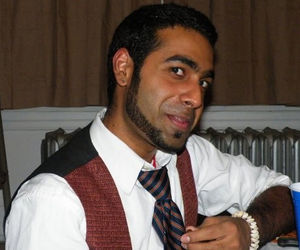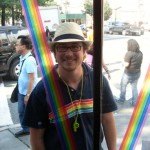| Willipedia is now back online as of 5/5/2019 |
| It has been several years since Willipedia closed. Please help get it updated! |
| Go to the Willipedia 2.0 Project to learn more. |
Queer Student Union
http://i41.tinypic.com/2j3punq.jpg
| Type of group | Community Building, Activism, Social Outreach, General Education |
|---|---|
| Selective | No |
| Membership | 100+ |
| Meeting time | Thursdays at 9 P. M. |
| Meeting place | Gender and Sexuality Resource Center (Hardy House) |
| Office | Gender and Sexuality Resource Center (Hardy House), 2nd Floor |
| Website | http://www.williams.edu/MCC/resources/qresources.php |
The GLTBQ organization on campus (formerly known as the "Eph Rainbow Alliance"). Especially known putting on the out-of-control Queer Bash parties every fall and spring. They also bring guest speakers to campus to speak on queer and LGBT issues, hold more or less weekly discussions, do film screenings, and serve as a network of support for GLBTQ students.
Meetings are Thursday nights (when announced) at 9 P. M. in Hardy House. All are welcome, and there are frequently snacks.
The current 2008–2009 board consists of Johannes Wilson '11 (co-chair), Raff Donelson '09 (co-chair), Veronica Rabelo '11 (Event Coordinator), Joshua Goldberg-Sussman '09 (Event Coordinator), Jonathan Schmeling '12 (Publicity Coordinator), Jack Wadden '11 (Political Action Coordinator), Kaybi DiAngelo '11 (Secretary), and Chelsea Luttrell '11 (Treasurer).
Questions can be directed to the secretary, at jpw1.
Check out their website under the Multicultural Center and their independent website for all things LGBTQ related on campus.
History
April 9ᵗʰ, 1976: The first organization on campus is created, WGSO, the Williams Gay Support Organization. WGSO’s call for new members in the Williams Record sparks heated debate and controversy, creating a flurry of articles in support and denouncing the new organization.
April 16ᵗʰ, 1976: Student stands on chair in Mission Park dining hall, actively denouncing the WGSO and the “Gay Support” platform.
December 6ᵗʰ, 1977: Williams College President Chandler opposes change to non-discrimination policy to include sexual orientation.
January 6ᵗʰ, 1978: Faculty rejects a College Council proposal to amend the anti-discrimination clause of Williams College to include sexual orientation. Debate ensues amongst students, faculty, and the president.
March 10ᵗʰ, 1978: First panel by gay activists on “Coming Out.”
April 14ᵗʰ, 1978: Gay rights supporters wear jeans on National Blue Jeans Day.
October 3ʳᵈ, 1978: WGSO becomes GPU, the Gay People’s Union, in order to create a broader presence on campus.
March 17ᵗʰ, 1981: “Coming Out” meeting held at Weston Language Center.
September 27ᵗʰ, 1983: GLU sponsors AIDS talk.
October 4ᵗʰ, 1983: Gaudino Forum on “Gay at the Movies, Gay at Williams.”
October 5ᵗʰ, 1983: The GPU establishes a new name, the GLU – Gay/ Lesbian Union in order to avoid being stigmatized as an all-male organization. A new gay hotline is instated for students to talk about their sexuality.
April 23ʳᵈ, 1985: Controversy erupts over a student’s statement that the Berkshire Quad is a ghetto of the College’s “misfits and homosexuals.” As a result, a crowd of over 300 students, faculty, staff, and administrators rallied in a celebration of diversity. However, issues over student housing, marginalization, and diversity persist and disputes between the student and the BSU, GLU, and Berkshire Quad members continue.
November 9ᵗʰ, 1985: Defacement of GLU event poster.
March 4ᵗʰ, 1986: Open panel discussion on homosexual life at Williams. Over 100 students attend a conversation on coming out and counseling assistance.
April 15ᵗʰ, 1986: First annual Lesbian and Gay Awareness Day. The day features an information table, rally, documentary, and reception. The day focuses on acceptance, diversity, and presence of gay and lesbian life on campus. Over 150 people attend the rally.
1987: The GLU changes its name to the Williams Bisexual, Gay, and Lesbian Union (BGLU).
February 24ᵗʰ, 1987: Students protest CIA’s discrimination in hiring as it recruits on campus. CIA responds in Record Article, citing that the CIA does not discriminate against any group, but that “it examines the whole person.”
May 5ᵗʰ, 1987: Second Annual rally on Lesbian and Gay Awareness Day.
October 13ᵗʰ, 1987: Disputes on whether Williams should allow the Marines to recruit on campus, considering their ban on homosexuals joining the Navy.
October 17ᵗʰ, 1987: Gay and Lesbian alumni organize to form first network. An organizational meeting and dinner on campus is held. The network is originally created to address a deficiency in alumni events, with its focus on children and spouses.
December, 1987: First openly gay faculty member receives tenure.
April 19ᵗʰ, 1988: First Gay awareness week. In the words of a BGLU student leader, “We wanted to challenge the campus to examine their homophobia. A week makes more of a coninuous confrontation, while a day is easily dismissed.” Events include a rally, men wearing skirts to class, and stickers proclaiming “Why Assume I’m Heterosexual?”
April 22ᶯᵈ, 1988: The Issue, a student-run newspaper at Williams, has a centerfold on sexuality, including interviews with Faculty and students.
November 29ᵗʰ, 1988: Acting Dean of the College, Joan Edwards, issues a letter notifying the Williams community of defacement to BGLU posters, signs, and notices in a display case, discouraging future hostile behavior. The vandalists remain anonymous.
April 5ᵗʰ–9ᵗʰ, 1989: College Council sponsors the very first sexual awareness week to deal with issues of pregnancies, date rapes, and especially STDs.
April, 1989: Sex Month! Between sexual awareness week and gay pride week, the campus tackles pertinent and provocative issues. Included in this month, a showcase of men and women in various physical contact, with an image of wrestlers causing controversy. Disputes over chalking recurs, with Buildings & Grounds first scrubbing away BGLU chalkings, then called off with an apology from the Dean.
November, 1989: Health Services and WCMA collaborate on an AIDS Awareness Week.
January, 1990: Discussions throughout month on AIDS and its role at Williams.
February 13ʳᵈ, 1990: BGLU display case in Baxter is vandalized again.
April 13ʳᵈ, 1991: Gay Pride Week includes movice showings, lectures, poetry readings, and a BGLU Party in Currier Ballroom.
November, 1991: BGLU chalks at homecoming, and distributes promotional pamphlets and stickers. This sparks a letter from a concerned parent MD denouncing the BGLU’s presence, and considering the BGLU’s organization one with possible chemical/ anatomical pathology.
October 5ᵗʰ–11ᵗʰ, 1992: BGLU celebrates National Coming Out Week with both confidential and public events.
February, 1993: Student gets expelled for impersonating a homosexual and calling two male students, pretending to be attracted to them. The calls were made in response to the two males harassment of various females on campus. Disputes result over whether this incident is homophobic, and the student pursues a civil suit against the college.
April 11ᵗʰ–18ᵗʰ, 1993: Queer Pride Week. Queer Bash, March on Washington, and other events.
October 7ᵗʰ, 1994: The Queer Straight Alliance is created “to fill the void between queers and straights at Williams and the greater community.” (The BGLU is still in existence)
October, 1994: A homophobic and physically threatening letter is submitted to the Daily Advisor. The Dean’s office notifies and denounces the incident in a letter to the William’s community.
January, 2000: Queer Life Coordinator, Stephen Collingsworth, is appointed to a permanent position in the MCC staff.
December, 2005: The Queer Student Union (QSU) ratifies a constitution.
Spring 2006: Kareem Khubchandani becomes the first Queer Life Coordinator.
Fall 2008: justin adkins takes the Queer Life Coordinator position.
November 28ᵗʰ, 2009: The word "Fag" is seen spray painted in the common room of Mills-Dennett 1. In response, members of the QSU and Women's Center stage a sit-in in Hardy House to protest and make 5 demands to the administration. These demands were:
- Queer Studies
- Better training for Junior Advisors on Queer and Women issues
- A Gender and Sexuality Resource Center
- Gender neutral housing
- The Queer Life Coordinator be promoted to a full-time position
Other LGBTQIAA Resources
- Anything But Str8 In Athletics – a support group for LGBTQIA athletes. Completely confidential, the group meets every other week on the second floor of the MultiCultural Center (Jenness House) from 9-10 P. M. on Wednesdays
- The Dively Committee – Mike Dively, Class of ‘61, has endowed a fund for Queer programming. This generous gift is managed by the Dively Committee has helped fund trainings for staff around the needs of transgender folk, drag shows, academic presentations, discussion forums, and queer theater performances.
- LGBT Advisory Committee – The LGBT Advisory Committee was started by Stephen Collingsworth in 2002 as an informational conduit for students, faculty and staff. This group is chaired by the Queer Life Coordinator and meets monthly for lunch in Hardy House. The group is purposefully comprised of people across campus to make sure that a variety of voices are being heard. The committee also advises the Queer Life Coordinator and helps form suggestions for policy changes and campus wide initiatives. If you are interested in joining the LGBT Advisory Committee contact justin (justin.adkins@williams.edu)
- Williams Bisexual, Gay, Lesbian and Transgendered Alumni (BiGLaTA) – an alumni network. Reasons given to join:
- It's free!
- You gain access to an inner circle network of Williams alums — great networking opportunity and access to jobs, housing, and more
- Invitations to BiGLATA events across the country
- Invitations to BiGLATA Reunions on campus
- Invitations to BiGLATA events at your class reunions
- Invitations to other schools' LGBT alumni group events — a great way to connect with other LGBT people in your community
- Great way to keep in touch with your classmates
- Great way to get to know people from other classes that you might never otherwise get to know
- Annual newsletters
- Keep in the loop with what's going on on campus
- Help improve the experience of current and future LGBT students
- Find out about BiGLATA student internships
- queer.williams.edu, a site that places all queer resources in one location. For any books in the library of the Gender and Sexuality Resource Center, any queer groups on campus, any random queer articles or news, plus more – go an take a visit.

